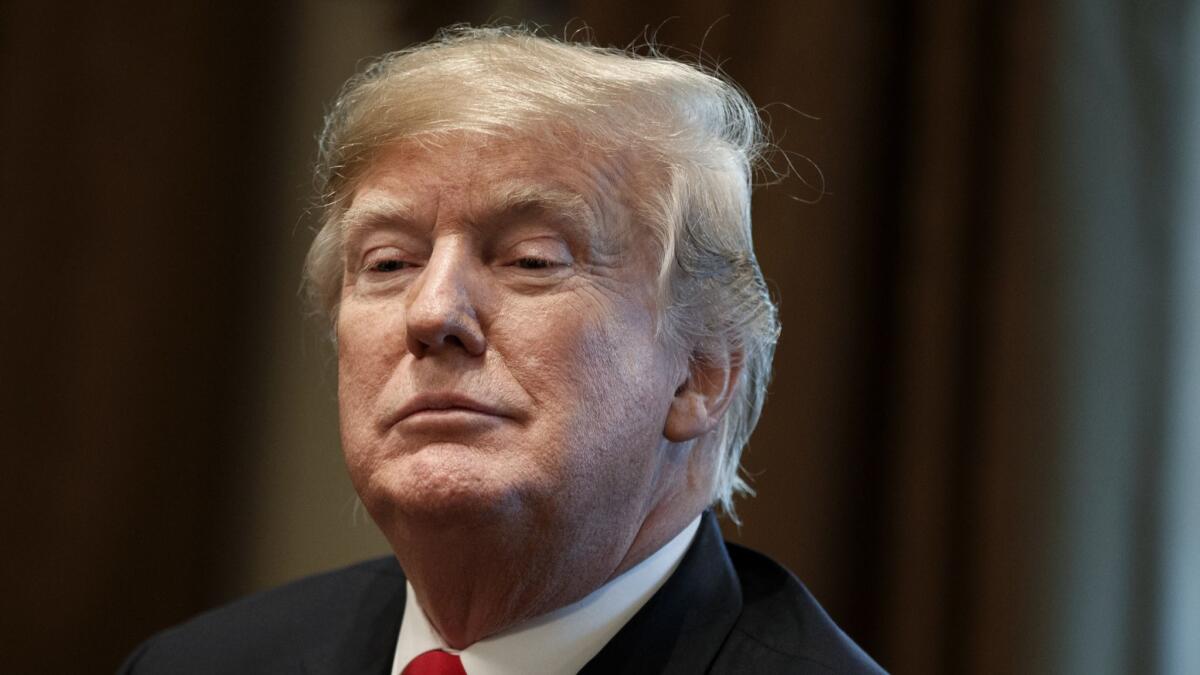With no end in sight to the shutdown, Republicans continue to try to maneuver around Trump

Reporting from Washington — With a partial government shutdown in its ninth day, President Trump appeared increasingly isolated in his demand for $5 billion for a border wall and his insistence that such a barrier would have prevented the deaths of two child migrants in U.S. custody this month.
Senior Republican allies of the White House, appearing on news-talk shows Sunday, acknowledged that the president’s full demands on border security would almost certainly go unmet.
They also said no quick resolution is in sight, even as the detrimental effects of the shutdown – for which Trump earlier declared he was “proud” to take responsibility -- are becoming more pronounced.
“Right now we’re at a standoff,” said Sen. Richard Shelby (R-Ala.), the head of the Appropriations Committee.
One-quarter of the government is shut down, and about 800,000 federal workers are either working without pay or on furlough. The impact on the general public is expected to widen after the Christmas-New Year holidays.
Appearing on CBS’ “Face the Nation,” Shelby said he had tried to get Trump to compromise on his demands, but “the president wants more” than the $1.3 billion Democrats have offered on border security.
“If we blame each other, this could last a long, long time,” Shelby said.
Sen. Lindsey Graham (R-S.C.), a staunch Trump supporter on most issues, is floating a potential deal that would give the president $5 billion for border security in exchange for guarantees for “Dreamers” brought illegally to the United States as children and extension of temporary protected status for hundreds of thousands of immigrants from several countries in Central America and Africa whom the administration is seeking to deport.
That proposal highlighted the diminishing leverage the White House has with Democrats controlling the House as of Thursday.
A year ago, Democrats agreed to a deal that Graham backed that would have given Trump five times as much, $25 billion for border security, in exchange for roughly those same conditions. Trump briefly agreed to that deal, then reneged.
Graham, who said he was meeting with Trump on Sunday to try to temper the president’s abrupt announcement that he was pulling U.S. troops out of Syria, vowed that “there will never be a deal without wall funding.”
But the senator, interviewed on CNN’s “State of the Union,” said Republicans were prepared to “offer something as an incentive” for such expenditures.
Graham also opened the door to greater scrutiny of the deaths this month of two Guatemalan children in U.S. custody after being apprehended near the border. The South Carolina Republican, the likely incoming head of the Judiciary Committee, said he would hold hearings on the deaths of 7-year-old Jakelin Caal, and 8-year-old Felipe Gomez Alonzo.
Trump tweeted Saturday that the deaths were “strictly the fault of the Democrats and their pathetic immigration policies” and added that “Border Patrol needs the Wall and it will all end.”
Critics swiftly noted that the immigration policies Trump says he objects to had been in place for years with no child deaths until now. They also faulted him for failing to show any compassion or concern over the children’s deaths, or to look to any preventive measures other than a border wall.
By contrast, the head of U.S. Customs and Border Protection, Kevin McAleenan, called the children’s deaths “absolutely devastating for us on every level” and urged a “multifaceted” approach to prevent such fatalities in the future.
Speaking on ABC’s “This Week,” McAleenan cited the need to “invest in Central America,” praising a State Department plan to increase aid to several violent and impoverished countries that have produced a spike in attempted migration.
But Trump moved last week to torpedo that initiative and instead cut off aid to the countries in question, tweeting that Honduras, Guatemala and El Salvador “are doing nothing for the United States but taking our money.”
Once the newly Democratic-majority House convenes this week, members are expected to move quickly to pass a measure to provide funds to reopen government agencies. Whether the Republican-controlled Senate will take up that measure remains unclear.
Senior White House aide Kellyanne Conway suggested Sunday that Trump would veto a spending plan that did not include money for the border wall, which he long insisted would be paid for by Mexico.
Trump made the wall a central element of his campaign, describing it at the time as a concrete structure the length of the border. More recently, he has alternated between demands for the wall and suggestions that he now wants a steel-slat barrier, similar to the fences that have been constructed by the last three administrations along lengthy parts of the border.
His outgoing chief of staff, John F. Kelly, said in an interview Friday with The Times that the administration, if not Trump, himself, early on had moved away from the concept of a wall.
“To be honest, it’s not a wall,” Kelly said.
Trump has blamed Democrats for failing to “come on over and make a deal on Border Security,” and suggested on Twitter that a Democratic focus on “presidential harassment” – Trump’s term for the various legal cases being built against him by federal prosecutors – was preventing a resolution of the deadlock.
Democrats again Sunday described Trump’s demands as a nonstarter.
Rep. Hakeem Jeffries (D-N.Y.), a member of the House Budget Committee, said the president and the GOP wanted to “waste” $5 billion in taxpayer money on “an ineffective medieval border wall.”
Speaking on “This Week,” Jeffries called the president’s desired barrier a “5th-century solution to a 21st-century problem.”
More to Read
Sign up for Essential California
The most important California stories and recommendations in your inbox every morning.
You may occasionally receive promotional content from the Los Angeles Times.










